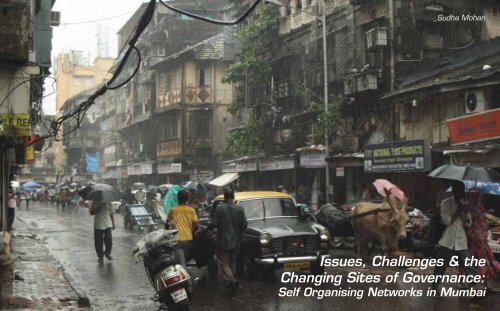Issues, Challenges & the Changing Sites of Governance.pdf
Issues, Challenges & the Changing Sites of Governance.pdf
Issues, Challenges & the Changing Sites of Governance.pdf
You also want an ePaper? Increase the reach of your titles
YUMPU automatically turns print PDFs into web optimized ePapers that Google loves.
030<br />
_Sudha Mohan<br />
031<br />
image credit_ Aditi Pinto<br />
<strong>Issues</strong>, <strong>Challenges</strong> & <strong>the</strong><br />
<strong>Changing</strong> <strong>Sites</strong> <strong>of</strong> <strong>Governance</strong>:<br />
Self Organising Networks in Mumbai
PUBLIC PARTICIPATION | 032<br />
The term <strong>Governance</strong> is derived from<br />
<strong>the</strong> Greek word ‘kybernan’ and ‘kybernetes’.<br />
It means to steer and to pilot or be at <strong>the</strong><br />
helm <strong>of</strong> things. It is a concept comprising <strong>of</strong><br />
complex mechanisms, processes, institutions<br />
and relationships through which citizens and<br />
groups articulate <strong>the</strong>ir interests, exercise<br />
<strong>the</strong>ir rights and obligations and mediate <strong>the</strong>ir<br />
differences. <strong>Governance</strong> is a more expansive<br />
term than government because it encompasses<br />
<strong>the</strong> activities <strong>of</strong> a range <strong>of</strong> groups as well as <strong>the</strong>ir<br />
relationships. “<strong>Governance</strong> refers to <strong>the</strong> State<br />
working with o<strong>the</strong>rs to create and recreate<br />
<strong>the</strong> capacity to govern.”(1) Government<br />
and <strong>Governance</strong> are not synonymous terms.<br />
Kooiman whose seminal work on governance<br />
initiated debate on <strong>the</strong> subject makes distinction<br />
between Government and <strong>Governance</strong>.<br />
According to him, “whereas government refers<br />
to a network <strong>of</strong> institutions and rules and to<br />
<strong>the</strong> act <strong>of</strong> governing itself, governance points<br />
to patterns that emerge from governing<br />
activities <strong>of</strong> social, political and administrative<br />
actors.”(2) <strong>Governance</strong> is <strong>the</strong> deliberative<br />
mechanism or process for making authoritative<br />
political choices. It defies simple definitions<br />
in a more plural political world with more<br />
complex set <strong>of</strong> societal problems. Government<br />
occurs when those with legally and formally<br />
derived authority and policing power execute<br />
& implement activities; governance refers to<br />
<strong>the</strong> creation, execution and implementation <strong>of</strong><br />
activities backed by <strong>the</strong> shared goals <strong>of</strong> citizens<br />
and organisations, who may or may not have<br />
formal authority.(3) As an activity, governance<br />
seeks to share power in decision-making,<br />
encourage citizen autonomy & independence<br />
& provide a process for developing <strong>the</strong><br />
common good through civic engagement.<br />
The concept has been explored in many<br />
academic fields and despite <strong>the</strong> recent<br />
popularity <strong>of</strong> governance at both <strong>the</strong> practical<br />
and <strong>the</strong>oretical levels; <strong>the</strong> concept continues<br />
to mean different things to different people. A<br />
review <strong>of</strong> <strong>the</strong> literature, however, suggests that<br />
<strong>the</strong>se differences tend to crystallise along two<br />
separate lines, one regarding <strong>the</strong> substantive<br />
content <strong>of</strong> governance and <strong>the</strong> o<strong>the</strong>r about<br />
its process in practice. Along <strong>the</strong> first line,<br />
<strong>the</strong>re is a difference between those who view<br />
governance as concerned with <strong>the</strong> rules <strong>of</strong><br />
conducting public affairs, on <strong>the</strong> one hand,<br />
and those, on <strong>the</strong> o<strong>the</strong>r, who see it as steering<br />
or controlling public affairs. One might say<br />
that <strong>the</strong> ‘rules’ approach tends to emphasise<br />
<strong>the</strong> institutional determinants <strong>of</strong> choice, while<br />
<strong>the</strong> ‘steering’ approach concentrates on how<br />
choices get implemented. Along <strong>the</strong> second<br />
line, <strong>the</strong> difference is between governance as<br />
activity or process. <strong>Governance</strong> is an ongoing<br />
phenomenon that is hard to pin down, but<br />
which bears on how results are achieved.(4)<br />
In most <strong>of</strong> <strong>the</strong> developing world, <strong>the</strong> debate<br />
about governance is taking place within a<br />
context <strong>of</strong> rapid urbanisation(5) combined<br />
with political and economic changes. These<br />
changes typically involve structural adjustment<br />
programme (SAP), deregulation <strong>of</strong> <strong>the</strong> economy,<br />
and privatisation <strong>of</strong> public assets. In o<strong>the</strong>r words<br />
<strong>the</strong> SAP programme was aimed at downsizing<br />
<strong>the</strong> role <strong>of</strong> <strong>the</strong> state in planned development<br />
and for promoting open and competitive market<br />
economies supervised by a minimal state. Those<br />
who stood to lose from structural adjustment<br />
<strong>of</strong>ten included bureaucrats (with <strong>the</strong> trimming<br />
<strong>of</strong> <strong>the</strong> civil service and through loss <strong>of</strong> power<br />
and perks) public sector workers (through<br />
privatisation and job loss) political party bosses<br />
(due to loss <strong>of</strong> influence and power base).<br />
However, <strong>the</strong> poor majority also lost a great<br />
deal for <strong>the</strong>y <strong>of</strong>ten experienced sharp increases<br />
in basic food prices as well as in medical and<br />
educational costs. It is in this context that this<br />
paper purports to examine governance. This<br />
paper makes attempts to analyse <strong>the</strong> term from<br />
<strong>the</strong> manner it was perceived initially to its current<br />
usage and more importantly <strong>the</strong> way <strong>the</strong> term<br />
has been interpreted and operationalised.<br />
This is examined by highlighting/locating <strong>the</strong><br />
changing sites <strong>of</strong> governance that has added<br />
salience to <strong>the</strong> lives <strong>of</strong> <strong>the</strong> people, especially<br />
<strong>the</strong> marginalised groups, in <strong>the</strong>ir attempt<br />
to make governments more accountable<br />
and governance a democratic reality.<br />
“GOVERNANCE” AND ITS USAGE<br />
The term <strong>Governance</strong> appeared on <strong>the</strong> World<br />
Bank’s agenda <strong>of</strong> development in <strong>the</strong> late 1980s.<br />
In fact, <strong>Governance</strong> was first problematised<br />
in a World Bank’s document <strong>of</strong> 1989 on Sub-<br />
Saharan Africa, which suggested that <strong>the</strong> Bank’s<br />
programme <strong>of</strong> adjustment and investment in that<br />
area were being rendered ineffective by a “crisis<br />
<strong>of</strong> governance”. <strong>Governance</strong>, on this account,<br />
came to be equated with sound management<br />
and was defined as <strong>the</strong> manner in which power<br />
is exercised in <strong>the</strong> management <strong>of</strong> a country’s<br />
economic and social resources for development.<br />
(6) The World Bank had its own interpretation<br />
<strong>of</strong> governance that emphasised upon <strong>the</strong><br />
economic content <strong>of</strong> both development<br />
and governance and at best only partially<br />
acknowledged <strong>the</strong> political context <strong>of</strong> <strong>the</strong> crisis<br />
<strong>of</strong> governance in <strong>the</strong> developing world.(7)<br />
In fact in many <strong>of</strong> <strong>the</strong> reports and publications<br />
during that period <strong>the</strong> WB advocated a<br />
more apolitical, managerial and technical<br />
dimensions <strong>of</strong> governance.(8) After 1995 <strong>the</strong><br />
WB’s position seemed to change marginally<br />
on issues relating to <strong>the</strong> role <strong>of</strong> state in<br />
development, where it acknowledged <strong>the</strong><br />
role <strong>of</strong> <strong>the</strong> state (not as a direct provider), but<br />
as a “partner, catalyst and facilitator.”(9)<br />
Thus <strong>the</strong>re were torrential <strong>of</strong> pronouncements<br />
on governance, democracy and development<br />
by <strong>the</strong> World Bank. And contemporary usage <strong>of</strong><br />
<strong>the</strong> concept <strong>of</strong> governance too came to have a<br />
number <strong>of</strong> very different meanings and uses.(10)<br />
THEORIES OF GOVERNANCE<br />
• <strong>Governance</strong> understood, as <strong>the</strong> minimal<br />
state is a blanket term referring to<br />
<strong>the</strong> reduction <strong>of</strong> public intervention<br />
in <strong>the</strong> economy and using markets or<br />
quasimarkets to deliver ‘public’ service.(11)<br />
• <strong>Governance</strong> conceived <strong>of</strong> as corporate<br />
governance is less to do with <strong>the</strong> formal<br />
institutions and structures and more<br />
concerned with overall systems by which<br />
organisations (private or public) are directed<br />
and controlled, commonly including principles<br />
<strong>of</strong> openness, integrity and accountability.(12)<br />
• <strong>Governance</strong> is <strong>of</strong>ten conceived <strong>of</strong> as <strong>the</strong><br />
new public management to distinguish it<br />
from <strong>the</strong> old public administration, which<br />
includes <strong>the</strong> application <strong>of</strong> private sector<br />
management principles to <strong>the</strong> public<br />
sector and <strong>the</strong> introduction <strong>of</strong> incentive<br />
structures in public provision.(13)<br />
• <strong>Governance</strong> as a socio-cybernetic system has<br />
been used to refer to <strong>the</strong> overall pattern <strong>of</strong><br />
interventions in <strong>the</strong> society by <strong>the</strong> combined<br />
and interacting effects <strong>of</strong> central and local<br />
governments and private sector organisations<br />
and business and voluntary sectors, brought<br />
about by negotiation and cooperation.(14)<br />
• <strong>Governance</strong> as self-organising network<br />
refers to <strong>the</strong> new structures <strong>of</strong> widespread<br />
social coordination and interaction between<br />
both public and private institutions and<br />
organisations in <strong>the</strong> delivery <strong>of</strong> services<br />
involving a greater role for private, nonstate<br />
or quasi-state institutions.(15)<br />
• <strong>Governance</strong> as international interdependence<br />
has been gaining tremendous salience<br />
especially from <strong>the</strong> 1990s. There is growing<br />
literature <strong>of</strong> <strong>Governance</strong> in <strong>the</strong> field <strong>of</strong><br />
International Relations. The hallowing<br />
out <strong>the</strong>sis argues that international<br />
interdependence erodes <strong>the</strong> authority<br />
<strong>of</strong> <strong>the</strong> state’s capacities for governance,<br />
though it remains a pivotal institution.(16)<br />
• The 1999 Human Development Report has<br />
developed a Humane <strong>Governance</strong> Index<br />
(HGI), a composite index <strong>of</strong> indicators<br />
measuring political, economic and civic<br />
governance. Indices such as responsiveness,<br />
participation, transparency and accountability<br />
feature in almost all-prevalent techniques<br />
<strong>of</strong> measuring good governance.(17)<br />
• Added to <strong>the</strong> above is <strong>the</strong> emerging agenda<br />
for new <strong>Governance</strong> where <strong>the</strong>re is emphasis<br />
upon certain skills viz., negotiation &<br />
persuasion, collaboration & enablement. New<br />
<strong>Governance</strong> processes include deliberative<br />
democracy, E-democracy, public conversation,<br />
participatory budgeting, citizen juries, study<br />
circles, collaborative policy making and<br />
o<strong>the</strong>r forms <strong>of</strong> deliberation and dialogue<br />
among groups <strong>of</strong> stakeholders or citizens<br />
and o<strong>the</strong>r partnership arrangements.(18)<br />
PUBLIC PARTICIPATION | 033
PUBLIC PARTICIPATION | 034<br />
<strong>Governance</strong> as elaborated briefly in its various<br />
<strong>the</strong>oretical frameworks has to be understood<br />
as a multidimensional concept. Apart from that,<br />
as was pointed out earlier (though <strong>the</strong> debate<br />
about governance is also significantly taking<br />
place within a context <strong>of</strong> rapid urbanisation),<br />
cities have to be seen not as autonomous but<br />
interdependent entities, functioning within <strong>the</strong><br />
local, national and international economies,<br />
environmental systems and socio-spatial<br />
relationships. Hence <strong>the</strong> fact and functioning <strong>of</strong><br />
governance in <strong>the</strong> urban domain encompasses<br />
and embraces a variety <strong>of</strong> ideas. These<br />
comprise <strong>of</strong> intergovernmental relations, such<br />
as negotiations, agreements and co-operative<br />
ventures among public and private parties,<br />
non-governmental and community - based<br />
organisations, implying bottom-up decision<br />
making process. There are <strong>the</strong>refore several<br />
interrelated dynamics in <strong>the</strong> governance function<br />
that can be refereed as its key components. In<br />
its concern to promote sustainable development<br />
<strong>the</strong> United Nations Development Programme<br />
(UNDP) has emphasized <strong>the</strong> virtues <strong>of</strong> public<br />
participation,accountability & transparency for<br />
effective democratic forms <strong>of</strong> governance.(19)<br />
Interestingly, in several countries in <strong>the</strong><br />
world and most certainly in India, <strong>the</strong><br />
democratisation <strong>of</strong> political processes and a<br />
degree <strong>of</strong> decentralisation <strong>of</strong> responsibilities<br />
involved a shift towards political pluralism<br />
to <strong>the</strong> local level with attempts to increase<br />
political and civic participation. This brings us<br />
to <strong>the</strong> next important aspect <strong>of</strong> <strong>Governance</strong>,<br />
that is, its main components, that render<br />
salience to both <strong>the</strong> meaning and <strong>the</strong><br />
operational dynamics to <strong>Governance</strong>.<br />
COMPONENTS OF GOVERNANCE<br />
Some <strong>of</strong> <strong>the</strong> most important components<br />
<strong>of</strong> <strong>Governance</strong> relate to: Decentralisation,<br />
Participation, Partnership and Accountability.<br />
Decentralisation brings decision-making<br />
back to <strong>the</strong> sub-national and local levels.<br />
This is a critical function because in an<br />
increasingly globalising world it is necessary<br />
to view <strong>the</strong> interrelations <strong>of</strong> <strong>the</strong>se various<br />
dimensions – global, regional, national, subnational,<br />
<strong>the</strong> local. In this regard, <strong>the</strong> role <strong>of</strong><br />
<strong>the</strong> nation-state gains increased importance<br />
as a mediating force between <strong>the</strong> forces<br />
<strong>of</strong> globalisation and localisation.(20)<br />
Participation is <strong>the</strong> power <strong>of</strong> people to<br />
determine <strong>the</strong>ir own mode <strong>of</strong> governance,<br />
representation, policies and services is an<br />
integral part <strong>of</strong> <strong>the</strong> logic <strong>of</strong> democratic<br />
governance. In designing decentralisation<br />
strategies it is important to ensure that adequate<br />
processes <strong>of</strong> accountability, transparency and<br />
responsiveness by all societal actors are in place.<br />
Recognition <strong>of</strong> interdependence is <strong>the</strong> essence<br />
<strong>of</strong> governance, where <strong>the</strong>re is interactive<br />
relationship between <strong>the</strong> horizontal (nonstate<br />
actors) and vertical levels (organisational<br />
set up) <strong>of</strong> government. More specifically it<br />
recognises <strong>the</strong> significance <strong>of</strong> <strong>the</strong> ‘local’ in<br />
addressing issues that is ei<strong>the</strong>r sidelined or<br />
subordinated by <strong>the</strong> ‘national’ government.(21)<br />
Partnership is ano<strong>the</strong>r important component<br />
that has <strong>the</strong> potential <strong>of</strong> generating change that<br />
is self-enforcing. Interestingly partnerships are<br />
viewed as “instruments <strong>of</strong> governance” by Jon<br />
Pierre.(22) Increasing opportunities to participate<br />
can improve state capability in three ways.<br />
First, when citizens can express <strong>the</strong>ir<br />
opinions formally or informally and press<br />
<strong>the</strong>ir demands publicly within <strong>the</strong> framework<br />
<strong>of</strong> <strong>the</strong> law, <strong>the</strong> state acquires some <strong>of</strong><br />
<strong>the</strong> credibility it needs to govern.<br />
Second, <strong>the</strong> emergence <strong>of</strong> o<strong>the</strong>r<br />
alternatives can help meet gaps in<br />
<strong>the</strong> supply <strong>of</strong> public goods.<br />
Third, backed by <strong>the</strong> citizen voice,<br />
partnerships can exert useful pressure<br />
in government to improve <strong>the</strong> delivery<br />
and quality <strong>of</strong> services. (23)<br />
Accountability in essence means holding<br />
public <strong>of</strong>ficials responsible for <strong>the</strong>ir actions<br />
and transparency, which is basically a call for<br />
open government to enhance accountability,<br />
limit corruption and stimulate consultative<br />
processes between government and private<br />
interests over public policy. Theorising and<br />
highlighting components <strong>of</strong> governance is<br />
<strong>the</strong> easiest part <strong>of</strong> <strong>the</strong> exercise <strong>of</strong> governance.<br />
The most difficult and critical part relates to<br />
<strong>the</strong> problems <strong>of</strong> governance in its operational<br />
dynamics. The next part will briefly look into<br />
<strong>the</strong>se aspects <strong>of</strong> <strong>the</strong> governance discourse.<br />
PROBLEMS OF GOVERNANCE<br />
Though it is easy to identify <strong>the</strong> components<br />
<strong>of</strong> governance it is more important to<br />
discern <strong>the</strong> problems <strong>of</strong> governance. This<br />
is not only important but also a crucial<br />
requirement because if <strong>the</strong> problems<br />
connected with governance are not tackled<br />
and combated effectively, governance<br />
would remain only in <strong>the</strong> rhetorical realm.<br />
This is important because in more practical<br />
operational terms governance refers to those<br />
measures that involve setting <strong>the</strong> rules for <strong>the</strong><br />
exercise <strong>of</strong> power and settling conflicts over<br />
such rules. In an increasingly fluid, sometime<br />
chaotic and complex context, which rules<br />
should be allowed to prevail is easily becoming<br />
a contested issue. <strong>Governance</strong> must <strong>the</strong>refore<br />
address itself to questions such as what do<br />
people consider good Does <strong>the</strong> law embody<br />
<strong>the</strong> idea <strong>of</strong> good What are <strong>the</strong> most trusted and<br />
effective types <strong>of</strong> social organisations What is<br />
<strong>the</strong> basis <strong>of</strong> local ideas <strong>of</strong> accountability How<br />
should those seeking good governance deal<br />
with <strong>the</strong> pervasive distrust <strong>of</strong> state power<br />
Thus <strong>the</strong> first governance problem is adaptation,<br />
viz., fitting traditional vertical systems to <strong>the</strong> new<br />
challenges <strong>of</strong> decentralisation and devolution<br />
and integrating new horizontal systems to <strong>the</strong><br />
traditional vertical ones. Second is capacity<br />
enhancing, i.e., government’s ability to govern<br />
and manage effectively in this environment.<br />
Closely related is <strong>the</strong> third governance<br />
problem, scale. Sorting out functions <strong>of</strong><br />
different levels <strong>of</strong> governance and in particular<br />
redefining <strong>the</strong> role <strong>of</strong> government itself.<br />
The next problem is with <strong>the</strong> notion <strong>of</strong> “good”<br />
governance itself. This arises due to <strong>the</strong> fact<br />
that it tends to be confused with “efficient”<br />
management (as was discussed earlier).<br />
Good governance so conceived - to be a<br />
chiefly technical instrument - had <strong>the</strong> effect <strong>of</strong><br />
narrowing its focus to norms that are not always<br />
easy to put into practice through some form <strong>of</strong><br />
external technical assistance. The operations<br />
<strong>of</strong> “<strong>Governance</strong> and Democracy” programs<br />
by many multilateral and bilateral aid agencies<br />
were indicative <strong>of</strong> this problem. The evolution<br />
<strong>of</strong> good governance <strong>the</strong>refore, is bound to take<br />
its time and is likely to be sustainable in most<br />
instances only when <strong>the</strong>y come about as an<br />
organic outcome <strong>of</strong> state-society interactions.<br />
As it was argued in one <strong>of</strong> <strong>the</strong> most effective<br />
and excellent accounts on <strong>the</strong> subject by<br />
Niraja Gopal Jayal, “good governance is<br />
inherently valuable, as it is a political value<br />
which must be negotiated by <strong>the</strong> political<br />
community in question and speak to <strong>the</strong><br />
relations between <strong>the</strong> citizens & state.” (24)<br />
However, our conception <strong>of</strong> good governance<br />
becomes a function <strong>of</strong> not merely efficient<br />
management but also <strong>of</strong> <strong>the</strong> quality <strong>of</strong><br />
civic engagement in <strong>the</strong> processes and<br />
structures <strong>of</strong> governance. Participation and<br />
civic engagement are critical determinants<br />
<strong>of</strong> good governance, a concept that<br />
addresses issues <strong>of</strong> social equity and political<br />
legitimacy and not merely <strong>the</strong> efficient<br />
management <strong>of</strong> infrastructure and services.<br />
Ano<strong>the</strong>r problem that is inherent but<br />
not sufficiently acknowledged is with <strong>the</strong><br />
conception <strong>of</strong> power itself. In <strong>the</strong> case <strong>of</strong><br />
governments, whe<strong>the</strong>r national or municipal,<br />
<strong>the</strong> existence <strong>of</strong> formal powers is not <strong>the</strong><br />
same as effective power. Much <strong>of</strong> what<br />
governments (national, state and local) are<br />
supposed to be able to do is undermined by<br />
<strong>the</strong>ir inability to implement or to enforce, or<br />
is subverted by informal arrangements or by<br />
rent-seeking, bribery and corruption. Much <strong>of</strong><br />
what actually happens is <strong>the</strong> result <strong>of</strong> a myriad<br />
individual and market-based decisions, taking<br />
place within a framework <strong>of</strong> governmental<br />
regulation and subject to manipulation.<br />
Thus outcomes are uncertain and subject to<br />
change. It is <strong>the</strong>refore imperative to look beyond<br />
formal institutional structures to understand<br />
where power lies and how decisions are made.<br />
PUBLIC PARTICIPATION | 035
036<br />
image credit_ Aditi Pinto<br />
CRISIS OF GOVERNANCE FROM THE<br />
SIXTIES THROUGH THE NINETIES<br />
The first two decades <strong>of</strong> post independent India<br />
was marked by <strong>the</strong> diminished role for any kind<br />
<strong>of</strong> collaborative development activities as most<br />
group efforts and initiative were subsumed<br />
within <strong>the</strong> nation building process. By <strong>the</strong><br />
late 1960s both <strong>the</strong> dominant political and<br />
economic models <strong>of</strong> development (that had<br />
marginalised large sections <strong>of</strong> <strong>the</strong> people) came<br />
to be questioned. This was mainly due to <strong>the</strong><br />
declining significance <strong>of</strong> institutional politics.<br />
Formal institutional structures were losing<br />
credibility. Political parties had increasingly<br />
become electoral machines, communalising<br />
politics for electoral gains, and trade unions<br />
not effectively incorporating <strong>the</strong> interests <strong>of</strong><br />
informal sectors <strong>of</strong> <strong>the</strong> economy. The decline<br />
<strong>of</strong> institutional politics thus coupled with <strong>the</strong><br />
exclusion <strong>of</strong> people at best or manipulation at<br />
worst, pushes <strong>the</strong>se sections fur<strong>the</strong>r away from<br />
mainstream politics, resulting in <strong>the</strong> growth <strong>of</strong><br />
organisations and associations that sought to<br />
address various issues. These organisations<br />
reflected <strong>the</strong> disenchantment with traditional<br />
institutions. Taking cognizance <strong>of</strong> this kind <strong>of</strong><br />
stirrings in <strong>the</strong> social sphere and by its own<br />
inability and unwillingness to address issues,<br />
governments (at <strong>the</strong> national, state and<br />
local levels) started to look for collaborative<br />
endeavours to implement decisions. It was<br />
realised that while <strong>the</strong>re are global problems,<br />
<strong>the</strong>re are no global or universal solutions<br />
to tackle <strong>the</strong>m. With rapid growth <strong>of</strong> urban<br />
population in <strong>the</strong>se countries, <strong>the</strong> limitations<br />
in <strong>the</strong> capacity <strong>of</strong> <strong>the</strong> urban local governments<br />
have also become more pronounced. Urban<br />
local governments have been unable or<br />
unwilling to handle <strong>the</strong> myriad functions and<br />
demands <strong>of</strong> <strong>the</strong> city and its citizens. As a result,<br />
governments have had to face several problems.<br />
Some <strong>of</strong> <strong>the</strong>se problems are discussed below.<br />
• Decentralisation efforts have not been<br />
implemented seriously. This has resulted<br />
in <strong>the</strong> lack <strong>of</strong> empowerment <strong>of</strong> urban<br />
local governments. Coupled with it are<br />
<strong>the</strong> excessive controls that are exercised<br />
by higher levels <strong>of</strong> government that are<br />
severely felt on <strong>the</strong> functional and financial<br />
responsibilities <strong>of</strong> local governments.<br />
• Rapid growth <strong>of</strong> cities and increasing<br />
migration to urban centres has exposed<br />
<strong>the</strong> inability <strong>of</strong> local governments to<br />
cope with <strong>the</strong> ever-increasing demand<br />
for services. These trends have led to<br />
impairment <strong>of</strong> local government functions.<br />
• There is a mismatch between <strong>the</strong> functional<br />
powers <strong>of</strong> urban local governments<br />
and <strong>the</strong>ir financial resources. As a<br />
consequence, local governments do not<br />
meet even basic citizen expectations.<br />
• In many countries, <strong>the</strong>re is a conflict <strong>of</strong><br />
interest between <strong>the</strong> local bureaucracy<br />
and <strong>the</strong> elected representatives. This is<br />
particularly true <strong>of</strong> Mumbai. At <strong>the</strong> city<br />
level, <strong>the</strong> organisational structure is highly<br />
centralised and <strong>the</strong> management style is<br />
very bureaucratic, lacking urban vision.<br />
• Local governments have increasingly<br />
begun to recognise <strong>the</strong>ir limitations and<br />
are now inclined to initiate new modes <strong>of</strong><br />
governance, including partnerships with<br />
<strong>the</strong> o<strong>the</strong>r stakeholders in <strong>the</strong>ir city for<br />
making both development and governance<br />
more meaningful and attainable.<br />
The initiatives for <strong>the</strong> formation <strong>of</strong> new<br />
partnerships and collaborations have increased<br />
in <strong>the</strong> 1990s to support and supplement<br />
government efforts. Communities too have<br />
organised <strong>the</strong>mselves as providers. They have<br />
responded to <strong>the</strong> inadequate basic public<br />
services and <strong>the</strong> inability <strong>of</strong> local and state<br />
governments to deliver goods. They have cooperated<br />
with <strong>the</strong> government and <strong>the</strong> nongovernmental<br />
sectors and formed <strong>the</strong>ir own<br />
community organisations. This suggests a new<br />
era <strong>of</strong> partnership politics. Such paradigm shifts<br />
have taken place in many parts <strong>of</strong> <strong>the</strong> world,<br />
and because <strong>of</strong> <strong>the</strong>ir success <strong>the</strong>y have been<br />
described as <strong>the</strong> ‘quiet revolution in local<br />
governance.’(25) It can be asked that with this<br />
kind <strong>of</strong> renewal, would development efforts<br />
and governance initiatives not degenerate<br />
into mere rhetoric <strong>of</strong> admirable <strong>of</strong>ficial goals<br />
It is one thing to identify desirable goals but<br />
ano<strong>the</strong>r to translate <strong>the</strong> same into effective<br />
practice. <strong>Governance</strong> issues relating to<br />
megacities like Mumbai have been constantly<br />
renewed, reviewed and rejuvenated.<br />
PUBLIC PARTICIPATION | 037
PUBLIC PARTICIPATION | 038<br />
MUMBAI – THE DYNAMIC MEGACITY<br />
Mumbai has grown phenomenally from an<br />
insignificant group <strong>of</strong> villages to becoming <strong>the</strong><br />
largest city in India, and a megacity <strong>of</strong> national<br />
and international importance. The city has had<br />
no ancient pedigree like some <strong>of</strong> <strong>the</strong> towns,<br />
which were <strong>the</strong> scenes <strong>of</strong> <strong>the</strong> conquests <strong>of</strong> Darius<br />
and Alexander. It has nei<strong>the</strong>r a glorious tradition<br />
to record nor can boast <strong>of</strong> any aristocracy.<br />
Mumbai also has no imperial or noble pedigree.<br />
And still by its enterprising and innovative<br />
spirit and dynamism, it has risen to become<br />
<strong>the</strong> ‘urbs prima’ <strong>of</strong> <strong>the</strong> country. Mumbai is<br />
<strong>the</strong> capital <strong>of</strong> <strong>the</strong> most urbanised Indian State<br />
- <strong>the</strong> state <strong>of</strong> Maharashtra. As per <strong>the</strong> 2001<br />
census, Mumbai accounts for 12.5 percent <strong>of</strong><br />
Maharashtra’s total population <strong>of</strong> 96.87 million.<br />
It boasts <strong>of</strong> 12 Municipal Corporations, 233<br />
Municipal Councils and 7 cantonments in urban<br />
Maharashtra. The 12.5 million inhabitants<br />
occupy an area <strong>of</strong> 437.71 square kilometres. (26)<br />
Mumbai is a city <strong>of</strong> contrasts and encompasses<br />
several facets <strong>of</strong> life. It reflects within its<br />
boundaries both, <strong>the</strong> ills that afflict any city and<br />
its citizens and <strong>the</strong> dynamism and flexibility that<br />
are its driving forces. In fact, in contemporary<br />
Mumbai, <strong>the</strong> existence <strong>of</strong> parallel cities is a very<br />
striking phenomenon. In o<strong>the</strong>r words, affluence<br />
and affliction are both part <strong>of</strong> Mumbai. This city,<br />
which has global pretensions, houses more than<br />
half <strong>of</strong> its people in slums. Mumbai is <strong>the</strong> most<br />
densely populated city in India and ranks second<br />
to Tokyo as <strong>the</strong> most crowded city in <strong>the</strong> world.<br />
It is on <strong>the</strong> one hand, an epitome <strong>of</strong> modernity<br />
and culture as it symbolises <strong>the</strong> best that <strong>the</strong><br />
human spirit and enterprise have wrought.<br />
On <strong>the</strong> o<strong>the</strong>r hand, it also represents <strong>the</strong> sordid<br />
side <strong>of</strong> human life - <strong>the</strong> dehumanising and<br />
debilitating aspects that thwart that spirit. This<br />
dualism is due to several reasons. A number<br />
<strong>of</strong> factors such as poverty, lack <strong>of</strong> employment<br />
in <strong>the</strong> villages, industrial and technological<br />
advancements that sometimes render labour<br />
as surplus & o<strong>the</strong>r socio-cultural factors have<br />
contributed to <strong>the</strong> urban blight. However, it<br />
is also important to point out that this city’s<br />
pulsating spirit and <strong>the</strong> never-say-die attitude<br />
has led to many dynamic changes over <strong>the</strong> last<br />
several decades. The current process is also<br />
one <strong>of</strong> change, churning and transformation<br />
taking place in this Megacity. Given this kind <strong>of</strong><br />
a dual city, with its own peculiar development<br />
problem that has consequences for governance,<br />
Mumbai has seen <strong>the</strong> rise <strong>of</strong> interesting forms<br />
<strong>of</strong> civic and governance coalitions that are<br />
both relevant and very meaningful, making<br />
governance both operational and dynamic.<br />
Some exemplars in <strong>the</strong> changing sites <strong>of</strong><br />
governance in Mumbai will be <strong>the</strong> next focus.<br />
CHANGING SITES OF GOVERNANCE<br />
Thus <strong>Governance</strong> especially since <strong>the</strong> nineties<br />
has come to refer to self organisation, interorganisational<br />
networks characterised by a<br />
shared set <strong>of</strong> goals, interdependence and<br />
interfacing with <strong>the</strong> state in a manner that is both<br />
beneficial in (<strong>the</strong> short run) and empowering<br />
(in <strong>the</strong> long) for <strong>the</strong> members concerned. More<br />
importantly, governance also has come to<br />
be centred on <strong>the</strong> association <strong>of</strong> state ‘with’<br />
non-state and civil society actors at <strong>the</strong> site<br />
<strong>of</strong> living. Government action hi<strong>the</strong>rto led to<br />
uneven development and uneven reach.<br />
The change and shift in <strong>the</strong> sites <strong>of</strong> governance<br />
connotes a process <strong>of</strong> ‘reaching out’ between<br />
institutions <strong>of</strong> <strong>the</strong> state and organisations <strong>of</strong><br />
civil society and an embedding <strong>of</strong> informal<br />
self-organisation efforts and initiatives into<br />
<strong>the</strong> formal structures <strong>of</strong> government. It means<br />
faith in local initiatives, public service and an<br />
engaged citizenry. Since urban communities<br />
like <strong>the</strong>ir rural counterparts <strong>of</strong>ten work through<br />
informal social networks to solve some <strong>of</strong><br />
<strong>the</strong>ir common problems, changing sites <strong>of</strong><br />
governance earmarks <strong>the</strong> ability <strong>of</strong> <strong>the</strong> state to<br />
promote political engagement and to recognise<br />
<strong>the</strong> self-organising networks as <strong>the</strong> ‘site’ and<br />
‘space’ for political engagement in Mumbai. (27)<br />
Though <strong>the</strong>re are several such collaborative<br />
civic coalition governance endeavours<br />
and alliance politics going on in <strong>the</strong> city<br />
<strong>of</strong> Mumbai, attempt will be made here to<br />
highlight and analyse very briefly a few<br />
exemplars in <strong>the</strong> area <strong>of</strong> public distribution,<br />
communal amity and primary education.<br />
Partnership for Influencing <strong>the</strong><br />
Public Distribution System<br />
Public Distribution System (PDS) entails<br />
procurement and sale <strong>of</strong> foodgrains,<br />
issuance <strong>of</strong> cards to citizens and a network<br />
<strong>of</strong> fair price shops for cardholders. The<br />
objectives <strong>of</strong> <strong>the</strong> PDS are tw<strong>of</strong>old - providing<br />
basic foodgrains at a subsidised rate and<br />
controlling market prices. Though <strong>the</strong><br />
PDS constitutes <strong>the</strong> lifeline for <strong>the</strong> poor in<br />
Mumbai, <strong>the</strong> system is fraught with malaise.<br />
However, from <strong>the</strong> mid 1990s <strong>the</strong>re has been a<br />
very interesting development in this area. What<br />
emerged was a collaboration effort <strong>of</strong> <strong>the</strong> NGO,<br />
namely, <strong>the</strong> Rationing Kruti Samiti (RKS), which<br />
is a collective <strong>of</strong> around forty NGOs-CBOs, <strong>the</strong><br />
consumers <strong>of</strong> <strong>the</strong> rationing system, employees<br />
<strong>of</strong> <strong>the</strong> department <strong>of</strong> rationing and shopkeepers.<br />
The objectives <strong>of</strong> <strong>the</strong> collaboration were to help<br />
people have better access to regular and good<br />
quality grains, to facilitate a process <strong>of</strong> dialogue<br />
between <strong>the</strong> government machinery, consumer<br />
groups and <strong>the</strong> shopkeepers and to minimise<br />
corruption in <strong>the</strong> system and make <strong>the</strong> PDS more<br />
accountable and responsive to people. The RKS<br />
emerged as a major consumer organisation,<br />
fighting for <strong>the</strong> rights <strong>of</strong> <strong>the</strong> economically<br />
backward sections depending for its food needs<br />
on ration shops in <strong>the</strong> public distribution system.<br />
Among <strong>the</strong> poor, <strong>the</strong>re is little awareness <strong>of</strong><br />
<strong>the</strong> laws and policies that govern <strong>the</strong> right to<br />
food. This has led to severe misinterpretation<br />
<strong>of</strong> <strong>the</strong> law. For example, <strong>the</strong> law states that any<br />
person who has lived in <strong>the</strong> country for more<br />
than fifteen days and wants to cook food should<br />
have access to a ration card. But practices across<br />
<strong>the</strong> country have made a ration card definitive<br />
pro<strong>of</strong> <strong>of</strong> a citizen’s nationality. It is imperative<br />
to furnish pro<strong>of</strong> <strong>of</strong> residence before one can<br />
procure a card. Without <strong>the</strong> ration card, a citizen<br />
cannot apply for a passport or even be listed as<br />
a voter. This has biased PDS against <strong>the</strong> poor,<br />
who <strong>of</strong>ten do not have pro<strong>of</strong> <strong>of</strong> residence.(28)<br />
The RKS Works at Three Levels<br />
i.e., Organisation and action in <strong>the</strong> form <strong>of</strong><br />
demonstrations and sit-ins at <strong>the</strong> city level;<br />
instituting monthly meetings in <strong>the</strong> city<br />
attended by ration <strong>of</strong>ficers, NGOs and CBOs,<br />
and developing local vigilance groups.<br />
In every area <strong>of</strong> a district, RKS builds linkages<br />
between citizen groups and members <strong>of</strong> <strong>the</strong><br />
rationing department <strong>of</strong> <strong>the</strong> area. Interfaces<br />
range from training in <strong>the</strong> processes <strong>of</strong> <strong>the</strong><br />
PDS, to monthly meetings between rationing<br />
departments, individuals and activists <strong>of</strong> an<br />
area, to confrontational campaigns against<br />
corruption in <strong>the</strong> food distribution system. Even<br />
<strong>the</strong> confrontational campaigns are assisted by<br />
members <strong>of</strong> <strong>the</strong> Rationing Department, and<br />
have established RKS’s position as a force in<br />
streamlining <strong>the</strong> operations <strong>of</strong> <strong>the</strong> PDS.(29)<br />
With greater information and collective action,<br />
RKS has won many significant successes in<br />
Maharashtra. For example procedures and<br />
rules for issuing new ration cards have been<br />
clearly documented and access is quicker,<br />
decentralised, and transparent. A Kerosene<br />
Distribution Improvement Committee has been<br />
established to make <strong>the</strong> procurement and<br />
distribution <strong>of</strong> kerosene efficient and reliable.<br />
The Department <strong>of</strong> Food and Civil Supplies<br />
regularly consults RKS for negotiations about<br />
food-security policy. RKS is now advocating<br />
effective timetables for kerosene distribution,<br />
strict penalties against black marketing and<br />
greater allocation <strong>of</strong> ration shops to cooperative<br />
societies and women’s groups.<br />
While RKS did help <strong>the</strong> PDS becoming more<br />
responsive to <strong>the</strong> people, <strong>the</strong> collaboration<br />
was not without constraints. Though <strong>the</strong><br />
collaboration has yielded many successes,<br />
<strong>the</strong>se achievements have not been translated<br />
into many tangible policy decisions to<br />
ensure long-term sustainability. However,<br />
<strong>the</strong> most important contribution <strong>of</strong> <strong>the</strong> RKS<br />
is in <strong>the</strong> area <strong>of</strong> making <strong>the</strong> urban poor at <strong>the</strong><br />
local level conscious <strong>of</strong> <strong>the</strong>ir rights and <strong>the</strong><br />
constant vigilance continues even today.<br />
PUBLIC PARTICIPATION | 039
PUBLIC PARTICIPATION | 042<br />
Local Activism for Safe Neighbourhood:<br />
Mumbai Mohalla (Neighbourhood)<br />
Committees.<br />
Cosmopolitan Mumbai was worst hit after<br />
<strong>the</strong> Babri Masjid demolition at Ayodhya, on<br />
6 December 1992. Mumbai witnessed two<br />
rounds <strong>of</strong> riots during a two-month period<br />
in which nearly a thousand people died and<br />
hundreds became homeless and jobless.<br />
The government machinery floundered very<br />
badly while controlling <strong>the</strong> riots. Police and<br />
civic administration came under severe media<br />
and public criticism. The citizens’ faith and<br />
confidence in <strong>the</strong> police force was shaken.<br />
However, many NGOs and hundreds <strong>of</strong><br />
concerned citizens came out to provide relief<br />
and rehabilitation to <strong>the</strong> riot victims. The<br />
government realising that it suffered from a<br />
lack <strong>of</strong> confidence in <strong>the</strong> eyes <strong>of</strong> <strong>the</strong> people<br />
and recognising <strong>the</strong> role <strong>of</strong> NGOs, routed<br />
all its funds and efforts though <strong>the</strong> NGOs.<br />
At <strong>the</strong> height <strong>of</strong> <strong>the</strong> riots, <strong>the</strong> Government <strong>of</strong><br />
Maharashtra set up a non-political citizen’s peace<br />
committee, which brought toge<strong>the</strong>r members<br />
from both Hindu and Muslim communities, along<br />
with police <strong>of</strong>ficers to <strong>the</strong> regular meetings to<br />
sort out minor problems and misunderstandings<br />
between <strong>the</strong> two communities.<br />
The experience <strong>of</strong> Bhiwandi, where it was first<br />
constituted, was that Mohalla Committees<br />
created trust between <strong>the</strong> two communities,<br />
which helped maintain communal harmony.<br />
By 1993 Mohalla Committees had been<br />
formed in every police station in <strong>the</strong> city.<br />
They were started with <strong>the</strong> aim <strong>of</strong> restoring<br />
trust and confidence between Hindus and<br />
Muslims on <strong>the</strong> one hand and between<br />
people and police on <strong>the</strong> o<strong>the</strong>r.<br />
The concept <strong>of</strong> Mohalla Committee<br />
encourages people to take responsibility<br />
for <strong>the</strong> quality <strong>of</strong> life in <strong>the</strong>ir areas. These<br />
committees provide a platform to people<br />
<strong>of</strong> different backgrounds to meet, plan and<br />
work toge<strong>the</strong>r to solve common problems.<br />
Mohalla Committees have been<br />
addressing four important aspects.<br />
a. Complaints related to police work,<br />
b. Civic issues, garbage, health<br />
and environment,<br />
c. Education, sports and youth affairs, and<br />
d. Communal harmony.<br />
There are about 24 Mohalla Committees in<br />
Mumbai today. It is found that those committees<br />
that are strong and effective have true teamwork<br />
between <strong>the</strong> facilitators, <strong>the</strong> inspectors in charge<br />
<strong>of</strong> police stations & <strong>the</strong> Deputy Commissioner.(30)<br />
The Mohalla Committees have successfully<br />
got <strong>the</strong> concurrence on a simple set <strong>of</strong> rules to<br />
be followed. They have worked out a system<br />
at <strong>the</strong> police station whereby any member<br />
<strong>of</strong> <strong>the</strong> committee can register a complaint<br />
about <strong>the</strong> police if <strong>the</strong> latter show a lack <strong>of</strong><br />
response. The police too acknowledge that<br />
<strong>the</strong>se committees are extremely useful in<br />
forging a meaningful relation with members<br />
<strong>of</strong> <strong>the</strong> public. The Mohalla Committees vary<br />
from one locality to ano<strong>the</strong>r. Nei<strong>the</strong>r <strong>the</strong>ir<br />
emergence nor <strong>the</strong>ir daily functioning follows<br />
a uniform pattern. The committees continue<br />
to act as a channel <strong>of</strong> communication with <strong>the</strong><br />
police and <strong>the</strong> public and have indeed played<br />
a major role in forging fruitful and workable<br />
interface between people and <strong>the</strong> police.<br />
This partnership had been put to <strong>the</strong> test on<br />
several occasions. The Mohalla Committees in<br />
Mumbai were put to severe test in <strong>the</strong> wake <strong>of</strong><br />
<strong>the</strong> Gujarat riots in March 2002. Local Mohalla<br />
Committees kept <strong>the</strong> situation under control,<br />
by mustering <strong>the</strong>ir resources to avert any<br />
untoward incident this time around in Mumbai.<br />
This is mainly due to <strong>the</strong> fact that trust and<br />
confidence have been built over <strong>the</strong> years<br />
through personal contacts and openness. Thus,<br />
<strong>the</strong> Mohalla Committees have enlisted <strong>the</strong><br />
participation <strong>of</strong> law enforcing agencies and <strong>the</strong><br />
bureaucracy in a dialogue amongst <strong>the</strong> parties<br />
in a crisis situation. This has proved to be one<br />
<strong>of</strong> <strong>the</strong> best ways <strong>of</strong> sensitising <strong>the</strong> groups.<br />
The only drawback regarding <strong>the</strong>se committees<br />
relates to <strong>the</strong> fact that <strong>the</strong>y rely heavily on<br />
<strong>the</strong> clout <strong>of</strong> former police chiefs such as Julio<br />
Ribeiro, Satish Sahney and R. H. Mendonca,<br />
trustees <strong>of</strong> <strong>the</strong> Mohalla Committee Movement.<br />
Besides, it has also been rightly pointed out<br />
that <strong>the</strong> committees could have been more<br />
effective had <strong>the</strong>y been able to garner <strong>the</strong><br />
support <strong>of</strong> civic authorities as well. However,<br />
<strong>the</strong> civic administration has been unable to<br />
convince its field <strong>of</strong>ficers to tie up with <strong>the</strong><br />
committees for solving problems involving<br />
water and garbage that <strong>of</strong>ten lead to fights in<br />
slums. Despite <strong>the</strong>se problems, it is <strong>the</strong> grit <strong>of</strong><br />
dedicated Mohalla committee workers and <strong>the</strong><br />
commitment <strong>of</strong> retired bureaucrats that has<br />
enabled <strong>the</strong> Mohalla Committees to promote<br />
communal harmony and community well-being.<br />
Partnership in Education.<br />
Pratham was founded in 1994, in cooperation<br />
with <strong>the</strong> municipal schools. The idea <strong>of</strong> a<br />
Bombay Education Initiative or Pratham took<br />
shape with <strong>the</strong> initiative <strong>of</strong> UNICEF <strong>of</strong>ficials in<br />
Maharashtra in 1993. This was thought <strong>of</strong> as<br />
a model programme to be owned and run by<br />
<strong>the</strong> residents <strong>of</strong> Mumbai, to demonstrate to<br />
<strong>the</strong> rest <strong>of</strong> <strong>the</strong> country, <strong>the</strong> need for primary<br />
education for all and <strong>the</strong> means to achieve it.<br />
UNICEF was <strong>the</strong> facilitator, willing to contribute<br />
<strong>the</strong> initial expenses while <strong>the</strong> initiative took<br />
<strong>of</strong>f, but expecting to be independent <strong>of</strong> it<br />
soon. Pratham was <strong>the</strong>refore registered as a<br />
trust, as a result <strong>of</strong> <strong>the</strong> assistance from UNICEF<br />
and with <strong>the</strong> initiative from <strong>the</strong> Brihanmumbai<br />
Municipal Corporation (BMC). UNICEF and<br />
BMC <strong>of</strong>ficials were appointed as ex-<strong>of</strong>ficio<br />
trustees entrusted with <strong>the</strong> mission to raise<br />
public support and create awareness for<br />
achieving universal primary education.<br />
The objective <strong>of</strong> Pratham was basically to<br />
emphasise upon <strong>the</strong> 3 ‘As’ Access, Attendance<br />
and Achievement. First and foremost, it was<br />
necessary to ensure that every child in Mumbai<br />
had access to a primary school, <strong>the</strong>n to ensure<br />
that <strong>the</strong> child attended school regularly and<br />
finally that <strong>the</strong> child actually, ‘learnt’ something.<br />
Given <strong>the</strong> socio-economic disparities in<br />
Mumbai, it was also necessary to focus<br />
attention on <strong>the</strong> most vulnerable population<br />
group. Thus, <strong>the</strong> target group was identified<br />
PUBLIC PARTICIPATION | 043
044<br />
image credit_ Aditi Pinto<br />
as those children who had no access to private<br />
schools and <strong>the</strong>refore were solely dependent<br />
on <strong>the</strong> municipal schools for <strong>the</strong>ir education.<br />
Pratham supports nearly 3000 Balsakhis<br />
(remedial education instructors) to provide<br />
additional academic support to around 35,000<br />
‘at-risk’ children in municipal schools.(31)<br />
Pratham has spread to most <strong>of</strong> <strong>the</strong> municipal<br />
schools in Mumbai and is working very closely<br />
with <strong>the</strong> school administration and <strong>the</strong> education<br />
department <strong>of</strong> local and state governments.<br />
For running such a huge programme, it has<br />
been successful in mobilising financial resources<br />
from <strong>the</strong> corporate sector. In order to do this,<br />
representatives <strong>of</strong> donor agencies, mainly from<br />
<strong>the</strong> corporate sector have been co-opted as<br />
permanent invitees in <strong>the</strong> mission. Corporate<br />
sector contribution made it possible for<br />
Pratham to widen its coverage in <strong>the</strong> city.(32)<br />
Pratham’s Bombay Education Initiative is a<br />
model for four-fold co-operation involving<br />
<strong>the</strong> voluntary sector, corporate sector,<br />
Municipal Corporation and <strong>the</strong> community.<br />
The objective <strong>of</strong> Pratham is not charity or<br />
channelling funds to <strong>the</strong> government system<br />
as it exists, but to catalyse and complement<br />
<strong>the</strong> process <strong>of</strong> improving <strong>the</strong> productivity<br />
<strong>of</strong> <strong>the</strong> educational system at <strong>the</strong> primary<br />
level, especially in <strong>the</strong> municipal schools.<br />
The Government <strong>of</strong> India and several o<strong>the</strong>r<br />
local governing bodies have accepted <strong>the</strong><br />
Pratham ‘model’ <strong>of</strong> involving <strong>the</strong> community<br />
in <strong>the</strong> achievement <strong>of</strong> <strong>the</strong> objective <strong>of</strong><br />
universal primary education. The Government<br />
<strong>of</strong> India has chosen <strong>the</strong> ‘Pratham model’<br />
as <strong>the</strong> norm by which funding will be made<br />
available under <strong>the</strong> newly instituted scheme<br />
<strong>of</strong> Innovative and Alternative schooling to<br />
all NGOs working in <strong>the</strong> urban areas.<br />
Pratham has also successfully demonstrated<br />
that <strong>the</strong> society can be involved in a<br />
partnership with <strong>the</strong> government in achieving<br />
<strong>the</strong> objectives set up by <strong>the</strong> government.<br />
FUTURE PERSPECTIVES ON REVITALISING<br />
PARTICIPATORY GOVERNANCE<br />
It is very important to take certain measures<br />
that would promote good governance<br />
and also streng<strong>the</strong>n and vitalise local<br />
democracy. Some <strong>of</strong> <strong>the</strong> measures through<br />
which this could be accomplished are:<br />
• Establishing direct contact between <strong>the</strong> local<br />
representatives and <strong>the</strong> people and reposing<br />
in <strong>the</strong> latter <strong>the</strong> right to recall Councillors<br />
who are ei<strong>the</strong>r indifferent or incapable.<br />
• Creating an enabling framework for civil action<br />
by respecting and incorporating <strong>the</strong> NGOs<br />
and Community based organisations (CBOs)<br />
as independent expressions <strong>of</strong> civil society.<br />
• Creating Public Relations Agencies <strong>of</strong><br />
Municipal governments and <strong>the</strong> institution<br />
<strong>of</strong> Ombudsman, along with a referendum<br />
programme on local urban community issues.<br />
• Addressing people’s grievances without<br />
undue delay and adopting principles<br />
<strong>of</strong> transparency, accountability and<br />
responsibility at local administration level.<br />
• Enhancing local control over resource raising<br />
and spending with accountable structures<br />
and transparent performance monitoring.<br />
• Focusing on key inter-sectoral issues such<br />
as urban poverty, <strong>the</strong> “brownagenda”<br />
improving health, water, sanitation, solid<br />
waste management; and lay down time<br />
bound goals and strategies to address <strong>the</strong>m.<br />
• Making policies according to <strong>the</strong> local<br />
situation instead <strong>of</strong> importing foreign<br />
paradigms or ideologies. (33)<br />
The changing sites and <strong>the</strong> practices <strong>of</strong><br />
governance at <strong>the</strong> local level with emphasis<br />
upon participation, partnership, transparency<br />
and accountability have consequences for<br />
policy-makers and policy-making bodies,<br />
not only at <strong>the</strong> local level, but also for <strong>the</strong><br />
state and <strong>the</strong> central governments.<br />
Second, contrary to fears expressed<br />
by critiques <strong>of</strong> <strong>the</strong> neo-liberal agenda/<br />
practices, <strong>the</strong> new governance at <strong>the</strong> local<br />
level does not absolve <strong>the</strong> state <strong>of</strong> its<br />
basic responsibilities, but ‘compels’ it to<br />
PUBLIC PARTICIPATION | 045
PUBLIC PARTICIPATION | 046<br />
‘perform’, demanding accountability, and<br />
a more responsible and responsive role.<br />
Third, <strong>the</strong>se new governance coalitions<br />
also ensure that <strong>the</strong> state plans, but does so<br />
more efficiently, effectively and with concerns<br />
for equity accommodating in particular <strong>the</strong><br />
most depressed and deprived in society.<br />
Fourth, <strong>the</strong>se efforts also ensure a bottomup<br />
decision making process with synergetic<br />
relationship between society and polity.<br />
Fifth, <strong>the</strong>se are efforts not to supplant but<br />
only to supplement <strong>the</strong> policy implementation<br />
mechanism <strong>of</strong> <strong>the</strong> government.<br />
And above all, <strong>the</strong>se successful efforts<br />
provide interesting and very useful examples.<br />
In fact operationally successful governance<br />
lessons are truly worthy <strong>of</strong> replication elsewhere.<br />
These are certainly small but very significant<br />
changes taking place in <strong>the</strong> Megacity <strong>of</strong><br />
Mumbai that do not pretend to alter <strong>the</strong> socioeconomic<br />
structural conditions, but <strong>of</strong>fer<br />
developmental alternatives and pragmatic<br />
practices <strong>of</strong> governance at <strong>the</strong> local level.<br />
However, <strong>the</strong>se governance efforts, if<br />
multiplied and spread across both within and<br />
across communities and <strong>the</strong> urban and rural<br />
space, can impact <strong>the</strong> rules <strong>of</strong> government,<br />
roles <strong>of</strong> institutions compelling <strong>the</strong>m to<br />
redefine both in <strong>the</strong> light <strong>of</strong> <strong>the</strong>se changes.<br />
CONCLUSION<br />
The slogan <strong>of</strong> 1990s has been_<br />
“globalisation <strong>of</strong> economics” & “localisation/<br />
decentralisation <strong>of</strong> politics” and a new<br />
agenda for humane governance. Globalisation<br />
<strong>of</strong> economics has been marked by an era<br />
<strong>of</strong> liberalisation and <strong>the</strong> state increasingly<br />
withdrawing from development activities.<br />
Localisation <strong>of</strong> politics (also referred<br />
to as ‘Globalisation <strong>of</strong> democracy’ by<br />
some staunch adherents) is not merely a<br />
geographical expansion <strong>of</strong> <strong>the</strong> scope <strong>of</strong><br />
democracy nor is it merely decentralising<br />
administrative powers and functions. It is<br />
a grass roots movement spearheading <strong>the</strong><br />
search for alternative forms <strong>of</strong> governance,<br />
rooted in traditions, allowing for maximum<br />
participation, democratic decentralisation<br />
and accountability. It is <strong>the</strong>refore crucial<br />
for <strong>the</strong> community to organise and compel<br />
<strong>the</strong> state to ‘perform’ its legitimate duty.<br />
When we pride ourselves on being <strong>the</strong> world’s<br />
largest democracy, <strong>the</strong> reference point is<br />
invariably to Parliament and State Legislatures<br />
or Prime Minister/Chief Minister and <strong>the</strong> Council<br />
<strong>of</strong> Ministers. But as one <strong>of</strong> <strong>the</strong> most important<br />
political and administrative units, <strong>the</strong> local<br />
governments are completely ignored. Politics<br />
is not only about Central Government and<br />
Parliament. It is about <strong>the</strong> effective working <strong>of</strong><br />
local governments, it is about strong alliances<br />
between varied forces viz., Non-governmental<br />
organisations, community based organisations,<br />
women’s groups, journalists, activists, and<br />
academics collaborating towards <strong>of</strong>fering<br />
suggestions and seeking solutions. The point<br />
that is stressed here is that different actors,<br />
groups and interests can and should effectively<br />
influence what happens within <strong>the</strong>ir local<br />
areas (both in <strong>the</strong> Urban and Rural) through<br />
formal and informal processes <strong>of</strong> decisionmaking<br />
and implementation. However, <strong>the</strong><br />
significant issue is that <strong>the</strong>ir ability to influence<br />
outcomes is not really equal. This is mainly<br />
because <strong>the</strong> marginalised sections’ access<br />
to political, economic and o<strong>the</strong>r resources,<br />
<strong>the</strong>ir legitimacy or <strong>the</strong>ir networking ability,<br />
and negotiating skills are largely dependent<br />
upon <strong>the</strong>ir ability to build coalitions and<br />
alliances. The test <strong>of</strong> good local democracy<br />
and governance is <strong>the</strong> extent to which <strong>the</strong>se<br />
groups succeed in accomplishing <strong>the</strong>ir goals.<br />
Good <strong>Governance</strong> at <strong>the</strong> grassroots level thus<br />
demands new problem solving capacities<br />
and arrangements in an ever increasingly<br />
complex world. It requires co-ordination <strong>of</strong><br />
multiple actors in diverse institutional settings,<br />
through new negotiation mechanisms.<br />
These mechanisms allow communities to act<br />
strategically ra<strong>the</strong>r than merely adapting to<br />
changes. In this endeavour <strong>the</strong>ir participation<br />
‘in’ and partnership ‘with’ decentralised<br />
governmental institutions and governance<br />
capabilities assumes special significance.<br />
_______________________________________________________________________________References<br />
1. Pierre, Jon, ed., Partnerships in Urban<br />
<strong>Governance</strong> (London: Macmillan, 1998), p.46.<br />
2. Kooiman, Jan, ed., Modern <strong>Governance</strong><br />
(London: Sage, 1993), p.3.<br />
3. Rosenau, James N., <strong>Governance</strong> without<br />
Government: Order and Change in World<br />
Politics (Cambridge University Press, 1992).<br />
4. For an elaborate account <strong>of</strong> <strong>the</strong> dynamic<br />
discourse on <strong>Governance</strong> kindly refer to<br />
<strong>the</strong> following works: Jon Pierre and Guy<br />
Peters, <strong>Governance</strong>, Politics, and <strong>the</strong> State<br />
(London: Macmillan, 2000). J. S. Jun, ed.,<br />
New <strong>Governance</strong> in Civil Society: <strong>Changing</strong><br />
Responsibility <strong>of</strong> Public Administrative<br />
Theory: The Challenge <strong>of</strong> <strong>the</strong> New Century<br />
(Westport, CT: Praeger, 2002). Donald F<br />
Kettle, The Transormation <strong>of</strong> <strong>Governance</strong><br />
(Baltimore: Johns Hopkins University Press,<br />
2002). J Kooiman, ed., Modern <strong>Governance</strong>:<br />
New Government Society Interactions<br />
(Thousand Oaks, CA: Sage, 1993). Lester<br />
Salamon, ed., The Tools <strong>of</strong> Government: A<br />
Guide to <strong>the</strong> New <strong>Governance</strong> (New York:<br />
Oxford University Press, 2002).<br />
5. As per <strong>the</strong> 2001 Census Report, India’s<br />
population stands at 1.27 billion, or roughly<br />
16.7 percent <strong>of</strong> <strong>the</strong> world’s population that<br />
spreads over 35 million plus urban cities and<br />
4,378 agglomerations. This comprises around<br />
30 percent <strong>of</strong> its population, in sharp contrast<br />
to only 15 percent who lived in urban areas in<br />
1947 when <strong>the</strong> country became Independent.<br />
During <strong>the</strong> last 59 years <strong>the</strong> population <strong>of</strong><br />
India has grown two and half times, but Urban<br />
India has grown over five times.<br />
6. World Bank, From Crisis to Sustainable<br />
Growth (Washington, D.C.: The World Bank,<br />
1989), p. 60.<br />
7. For an interesting account <strong>of</strong> reintroducing<br />
<strong>the</strong> ‘political’ content, see Adrian Leftwich,<br />
States Development: On <strong>the</strong> Primacy <strong>of</strong><br />
Politics in Development (Cambridge: Polity<br />
Press, 2000).<br />
8. <strong>Governance</strong> and Development (Washington<br />
D.C.: The World Bank, 1992). The <strong>Governance</strong><br />
Experience (Washington D.C.: The World<br />
Bank, 1994).<br />
9. The World Bank Report (Washington, D.C.:<br />
The World Bank, 1997), p. 1.<br />
10. R. A. W. Rhodes, Understanding <strong>Governance</strong>:<br />
Policy Networks, Gover nance, and<br />
Accountability (Buckingham, U.K.: Open<br />
University Press, 1997).<br />
11. Stoker, Jerry, “<strong>Governance</strong> as Theory,”<br />
International Social Sciences Journal, Vol.<br />
150 (March 1988), pp. 17-27.<br />
12. Clatworthy, Mark A, “Corporate <strong>Governance</strong><br />
under ‘New Public Management’: An<br />
Exemplification,” Corporate <strong>Governance</strong>: An<br />
International Review, Vol.8, no.2 (April 2000).<br />
13. B. G. Peters, and J. Pierre, “<strong>Governance</strong><br />
without Government: Rethinking Public<br />
Administration,” Jour nal <strong>of</strong> Public<br />
Administration Research and Theory, Vol. 8,<br />
no. 2 (April 1998), pp.223-243.<br />
14. Hirst, Paul, Associative Democracy: New<br />
Forms <strong>of</strong> Economic and Social <strong>Governance</strong><br />
(Cambridge: Polity Press, 1994).<br />
15. Hirst, Paul, From Statism to Pluralism:<br />
Democracy, Civil Society and Global Politics<br />
(London: UCL Press, 1997).<br />
16. Hirst, Paul, and Thompson, Grahame,<br />
Globalisation in Question: The International<br />
Economy and <strong>the</strong> Possibilities <strong>of</strong> <strong>Governance</strong><br />
(Cambridge: Polity Press, 1996).<br />
17. www.undp.org.in/UNDPNEWS/jan00/PG08.<br />
html<br />
18. Lisa Blomgren Bingham, Tina Nabatchi<br />
and Rosemary O’Leary, “New <strong>Governance</strong><br />
Processes: Practices and Processes for<br />
Stakeholder and Citizen Participation in <strong>the</strong><br />
World <strong>of</strong> Government,” Public Administration<br />
Review, Vol. 65, no. 5 (September/October,<br />
2005), pp. 547-558.<br />
19. UNDP, 1997, Conceptualising <strong>Governance</strong>,<br />
Discussion Paper 2 (NY: UNDP, 1997), p. 9.<br />
20. For both an interesting and elaborate account<br />
<strong>of</strong> this see, B. Ramesh Babu, Glocalisation<br />
and <strong>the</strong> Indian Nation State: Jurisdictions<br />
and Loyalties in Flux (New Delhi: South Asian<br />
Publishers, 2004).<br />
21. Heller, Patrick, “Degree <strong>of</strong> Democracy: Some<br />
Comparative Lessons from India,” World<br />
Politics, Vol. 52, no. 4 (July 2000), pp.484-519.<br />
22. Pierre, Partnerships in Urban <strong>Governance</strong>,<br />
p.20.<br />
23. Mohan, Sudha, Urban Development and New<br />
Localism (Mumbai, New Delhi and Jaipur:<br />
Rawat Publishers, 2005).<br />
24. Jayal, Niraja Gopal, “The <strong>Governance</strong><br />
Agenda: Making Democratic Development<br />
Dispensable,” Economic & Political Weekly<br />
(22 Feb 1997), p.410.<br />
25. Mlinar, Zdravko, “Local Responses to Global<br />
Change,” Annals <strong>of</strong> <strong>the</strong> American Journal <strong>of</strong><br />
Political and Social Sciences, Special Issue on<br />
Local <strong>Governance</strong> Around <strong>the</strong> World, Vol. 540<br />
(July 1995), pp.145-56.<br />
26. Government <strong>of</strong> Maharashtra, Economic<br />
Survey <strong>of</strong> Maharashtra, 1996-97 (Mumbai:<br />
Directorate <strong>of</strong> Economics and Statistics,<br />
Planning Department, 1997), p.5.<br />
27. Sudha Mohan, “Political Transformations and<br />
Capacity Building: Civil Society Networks and<br />
Civic Engagement in Mumbai,” in Simon<br />
Raiser and Krister Volkmann, eds., Civil<br />
Societies in <strong>the</strong> Globalizing Cities <strong>of</strong> South<br />
(Berlin: Free University Press, March 2005).<br />
28. Apnalaya, Annual Report: 1999-2000<br />
(Mumbai: Apanalaya, 2000), p.3.<br />
29. Joshi, Leena, Consumer Protection: Ration<br />
Kruti Samiti, http//www.mumbai/RKS<br />
30. Mohalla Ekta Committee: Documentation<br />
(Mumbai: December 1997).<br />
31. Partnerships for a Better Urban Future: A<br />
Report <strong>of</strong> City Level Dialogue, (Mumbai:<br />
Pratham, 1996), pp. 10-13.<br />
32. Chavan, Madhav, Building Societal Missions<br />
for Universal Pre-School and Primary<br />
Education: The Pratham Experience (Paris:<br />
International Institute for Educational<br />
Planning & UNESCO, 2000), p.12.<br />
33. Mohan, Sudha, “Revitalisation <strong>of</strong> Urban Local<br />
<strong>Governance</strong>, with special reference to <strong>the</strong><br />
74th Constitutional Amendment” in Nawaz<br />
Mody and K. Raman, eds., Revitalisation<br />
<strong>of</strong> Indian Democracy (Mumbai: Allied<br />
Publishers, 2001), pp.205-15.<br />
PUBLIC PARTICIPATION | 047

















